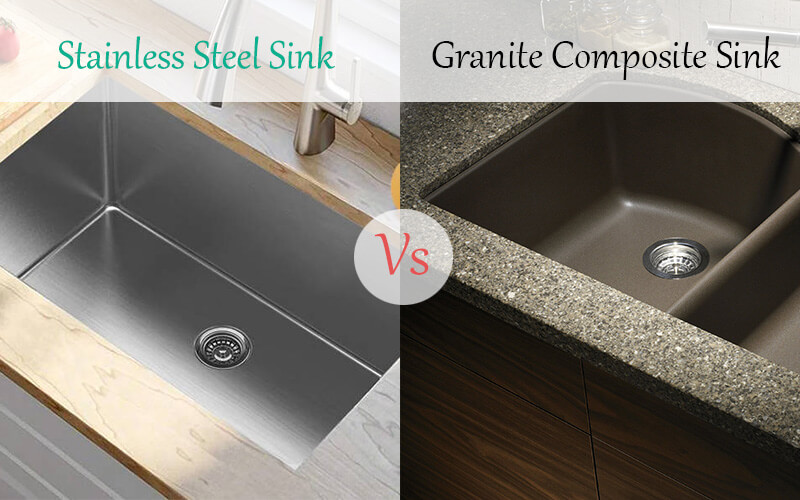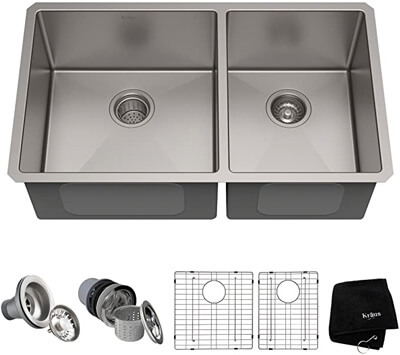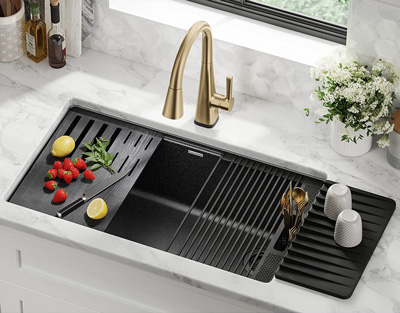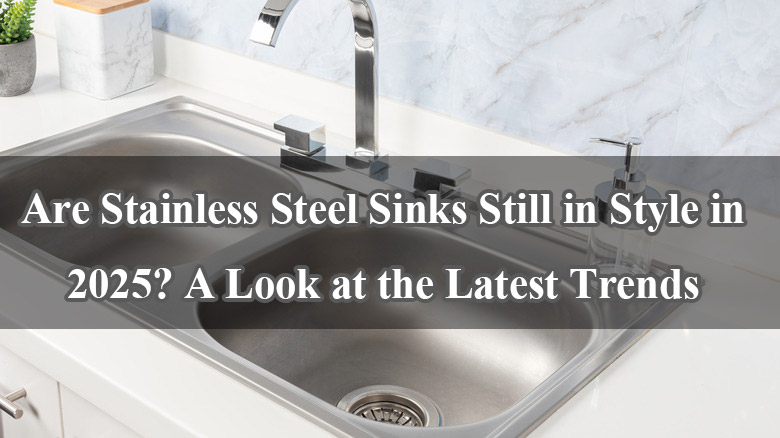Stainless Steel Vs Granite Composite Sinks: Which Is Better?

We are often confused when it comes to choosing a kitchen sink. Kitchen sinks in the market come in different sink materials, colors, shapes, sizes, designs, number of bowls, price ranges, brands, etc. With so many options, it can be time-consuming and troublesome to pick the best sink for your kitchen. As far as materials are concerned, there are different choices such as stainless steel, quartz, granite composite and so on. Well, stainless steel vs granite composite sink, which is better? Are granite sinks better than stainless steel sinks? What’s the difference between them? Well, that’s what we’re going to solve, so keep reading this post!
Stainless Steel Sinks
Stainless steel is the material of first choice for many different items, including kitchen sinks. Stainless steel sinks are popular for several reasons including their durability and inexpensive price.
These sinks come in different grades and sizes. The grade of a stainless steel sink tells you the quality of the steel. The higher the number, the better the quality. 304 stainless steel sinks are the highest grade you can buy. If the sink is 18/8 stainless steel, it contains 18% chromium and 8% nickel.
The gauge tells you the thickness of the steel. While this may seem counterintuitive, the lower the gauge, the thicker the steel. Typically, stainless steel sinks are available in sizes ranging from 14 to 22.
While stainless steel sinks have a very strict color palette, and they’re usually only available in silver, you can find different finishes. Mirror and satin finishes provide a reflective glossy finish. Brushed and matte finishes are also available if you prefer a matte look. Textured finishes are also available if you want to hide scratches and damage.
pros and cons
Like granite composite sinks, stainless steel sinks have pros and cons. The pros of stainless steel sinks include:
- Stainless steel is relatively inexpensive compared to most other kitchen sink options, especially granite composite sinks.
- You can find stainless steel sinks in different sizes. The heavier gauge is usually your best bet as it offers better durability. 304 stainless steel sinks are a popular choice for most homes.
- Minor scratches and scratches on the surface of the sink can heal on their own due to the reaction between the components of the sink and oxygen.
- These sinks are easy to install due to their light weight. You can install it yourself or hire a plumber for a lower price.
- Stainless steel sinks are more widely and easily compatible with your kitchen than granite composite sinks.
- They vary in price depending on the sink spec, brand, size, etc.
On the other hand, stainless steel sinks also have some disadvantages, as follows:
- Stainless steel sinks can be noisy, especially if you drop dishes or move things around in the sink. Some sinks have noise-reduction devices, but there will still be noise.
- These sinks come in only one color: silver. While silver harmonizes with most things, it may not be to some people’s aesthetic. If you’re looking for a specific theme or look, stainless steel may not be the best choice for you.
- Thin stainless steel sinks can easily deform over time.
- Metal can damage the finish and leave rusted metal chips on the sink.
- While it’s stain-resistant, items that rust the sink can leave spots.
Granite composite sink
As the name suggests, granite composite sinks are composed of a variety of materials. Generally, there are two main components: stone and acrylic. Since we’re talking about granite composites, it’s usually crushed mineral components (granite) and acrylics. The ratio of the two depends on the specific sink, most of which are molded into the shape of the sink by combining granite and quartz powder with acrylic resin.
These sinks cost significantly more than composite sinks due to the difficulty of obtaining the material and the manufacturing process required to make it. The overall look of a composite granite sink does not exactly mimic the look of natural stone. If you look at raw granite slabs, such as countertops, you will notice different inconsistencies and color patterns. Granite composite sinks have a uniform appearance, unlike natural stone.
Pros and Cons
Granite composite sinks have some pros and cons that you should consider. Some of the benefits of granite composite sinks include:
- Composite sinks are much less expensive than true solid granite options.
- Cleaning a composite sink is easy; all you need is hot water, mild dish soap, and a non-abrasive sponge. Bonus: Routine maintenance is secondary.
- These sinks are a great option if you like the modern aesthetic and color scheme of your kitchen. The mix of materials creates a uniform look, making it easier to find colors that match your kitchen.
- Composite sinks offer excellent durability. They are very tough, which translates to chip, dent and scratch resistance.
- These sinks are heat-resistant, allowing you to safely place warm fondues and pans in the sink without damaging them.
While the benefits are numerous, let’s consider some cons with granite composite sinks.
- Although less expensive than solid granite sinks, these can be significantly more expensive than similarly configured stainless steel sinks.
- Like natural solid stone, composite sinks are heavy. This can make installation tricky, especially compared to a stainless steel sink.
- While granite composite sinks are heat resistant, they are not always heat resistant. So when comparing brands, be sure to pay attention to the manufacturer’s specifications for heat resistance and durability.
- If you prefer the look of real granite, a composite granite sink may not be the best choice for you. If you want to perfectly match a natural granite countertop to your sink, or vice versa, you may have difficulty.
- While maintenance of a granite composite sink is simple, you need to be careful about what you use on the surface of the sink. Caustic chemicals and abrasive scrubbing pads can damage the overall appearance of the sink.
Are granite sinks better than stainless steel sink
It’s hard to say which of these two kinds of sinks is better. Indeed, both granite composite and stainless steel sinks are great options, and which is better depends on your personal preferences and what you’re looking for. For example, if you want a sink that is affordable, durable, and easy to install, a stainless steel sink is a good choice. However, if you prefer the look of granite composite and its durability, then go for a granite composite sink. Ultimately, the decision is up to you, your preference and budget. Each option has its pros and cons, so make the most of them!
Frequently Asked Questions (FAQ) of Stainless Steel Vs Granite Composite Sinks
1. Are granite composite sinks easy to scratch?
No, granite composite sinks are not prone to scratches. The combination of acrylic resin and stone powder creates a sturdy sink.
2. Are granite composite sinks chipped?
Similar to our answer to the previous question, no, composite granite sinks do not break easily. The materials in its construction make it exceptionally durable. However, while chips, scratches or dents are unlikely, it is possible.
3. Are granite sinks easy to stain?
Granite sinks do not stain easily, as long as they are well sealed. If natural stone is not properly sealed, it can be prone to deep stains.
4. Are composite sinks easy to stain?
No, they don’t stain as easily as other materials. Since there are no holes in the surface, you shouldn’t have noticeable stain problems.
 WOWOW Faucets
WOWOW Faucets







您好!Please sign in